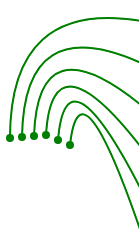Due to the fact that dementia patients in nursing homes, but also at home, have very little, if any, understanding of the restrictions on personal communication resulting from the COVID 19 crisis, the danger of progressive isolation is acute.
Due to the COVID-19 crisis there is currently a higher acceptance among relatives and also nurses, carers and doctors to realize communication with the patient on the basis of a tele-video conference. This would protect patients from direct contact and at the same time create more "closeness" than a pure telephone call, since patients are already very visually oriented in their emotions. However, it must first be shown in practice that this is also a viable option. The video communication (VC) is to take place via the "#dasgutenetz" at Diakonie Rummelsberg. Here would be in any case an approach for the use of the planned IEEDA ALOIS for the future, because this state of communication via VC with relatives will remain in the next years in any case, even if a realistic vaccination possibility against SARS-CoV-2 will be available next year. In order to initiate and maintain the VC without the need for additional carers, moderation is needed, which could be done by IEEDA ALOIS (and more).
The problem of loneliness will nevertheless continue to exist. Since the reduction of contacts will also further reduce the already limited drive in Alzheimer's patients, an accelerated progression of cognitive decline can be assumed. Here, an IEEDA like ALOIS can not only be a listener to the patients, but in a certain way become their "buddy", who can also be a memory helper, brain trainer and communication assistant in one single figure. Hereby the above mentioned aggravation of the communication situation would be countered in an effective way.
"Man lives according to his ability and possibility to communicate; if he loses these, he loses his life" (Ludwig Hohl, "Die Notizen oder Von der unvoreiligen Versöhnung", 1944).


 English
English  Deutsch
Deutsch